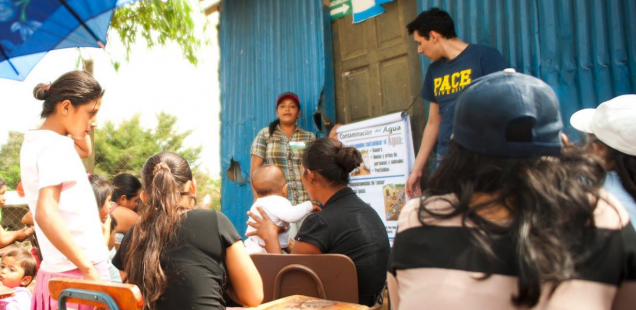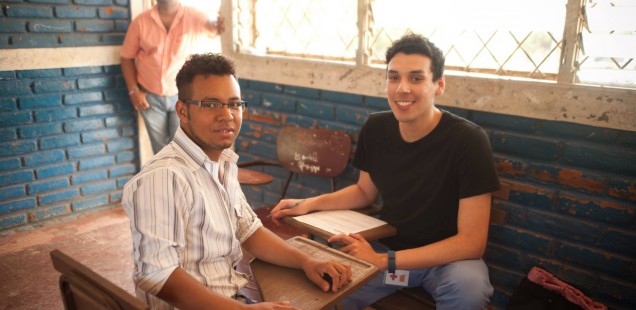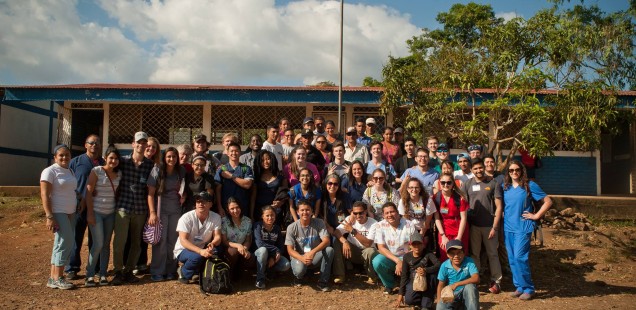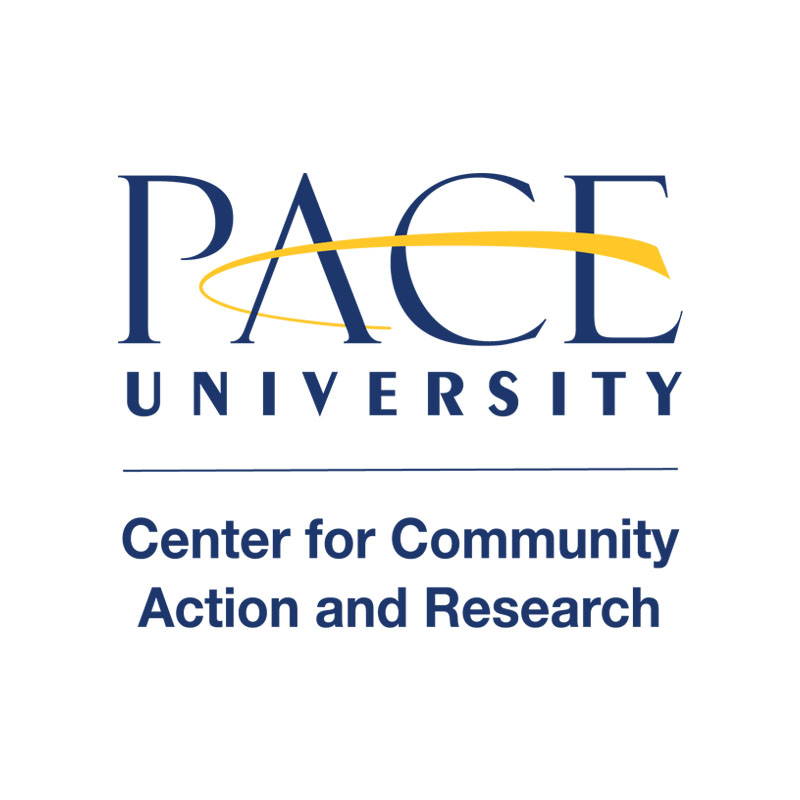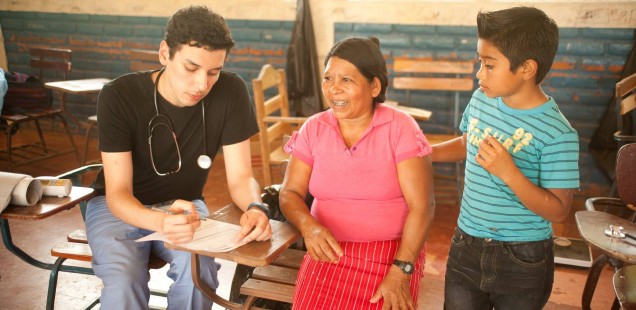
Volunteer Spotlight: Cesar Ballesteros ’18
On campus, Cesar Ballesteros is a pre-med Biology major, VP of the Minority Association of Pre-Health Students, Event Coordinator for Pace Alliance Française, a member of Student Leaders in Service – and now one of the co-founding members of Pace’s new Global Brigades chapter, which kicked off this Spring with a service trip to Nicaragua. Read on to learn more about Cesar’s impressive dedication to his future medical career, as well as his recent trip and what inspires him to devote his time to service.
Year of Graduation: 2018
Major: Biology BS
Minor: Sociology/Anthropology
Career Aspirations: I plan on continuing onto medical school after graduation. If I don’t get in, I’ll try again–if I still don’t get in, I’ll try again. If for some reason the universe doesn’t want me to attend medical school I also have great interest in joining the Peace Corps, or perhaps pursuing a Masters in Biology or taking on a corporate/governmental job involving modern languages and culture.
He shared with me his passion about wanting to become a health professional, and we bonded over the fact that medicine was our passion. Learning about the struggles in his life and his perseverance to want more and pursue his dream was extremely humbling.
How did you learn about Global Brigades? What inspired you to reach out and start working on putting a Pace brigade together?
Last summer, I remember researching different ways pre-med students could get involved during their summer/winter intersessions. I found Global Brigades through an article online and immediately found interest in joining a local chapter. Through further research, I found that almost every university in New York City had their own Global Brigades chapter…except Pace. The more I read into the various ways Global Brigades changes rural communities through local and university volunteers, the more I was inspired to start a chapter at Pace. I immediately contacted the regional chapter advisor, and was informed that another student at Pace named Christina was already in the process of starting a medical brigade chapter. I was then connected with her and from there the project took off.
What was the planning process like? Did you experience any particular challenges or successes?
After meeting with my new colleague, we both found common ground and began to work with the university to establish this new organization together. After hours of hard work and so many emails, Pace agreed to allow this chapter on campus — with the exception that a pilot brigade was to be conducted in order to test the waters and spark interest in the entire student body before being officially recognized. Christina and I immediately began the planning process for a spring break medical brigade.
One of the biggest challenges in planning this trip was trying to recruit students to join an organization that wasn’t yet officially recognized by the university. We weren’t allowed to hold meetings on campus, nor fundraise with the university since we were not yet an official “club” on campus. We tried having a meeting using the library’s student study rooms, but not many people showed. Ultimately, we were able to spread the word via professors and began to receive applications from a few interested students. Fortunately, we were able to find one passionate volunteer to join Christina and I on our 8-day medical brigade to Nicaragua. Since we were a small group, our chapter advisor Katy paired us up with the University of Arkansas. After the dates were set and the flights were bought, the pilot brigade was official and we were ready for Nicaragua!
Can you tell us more about the trip and your experience in Nicaragua? What was the most memorable or impactful moment?
The trip to Nicaragua was absolutely one of the most memorable trips I have taken so far in my life. Without exaggeration, there are simply no words to describe the invaluable experiences that I experienced on this trip. The 8-day medical brigade consisted of two days of travel, one day of medication preparation, three days of clinic, one day of joining a water brigade, and a special sightseeing day. Throughout the trip our small group got to bond with 25 other students from the University of Arkansas. Together we became a family and worked together to see and treat a record breaking 1,093 patients in the rural community of El Dorado, Jinotega.
There are so many memorable experiences I can talk about, but the one that will stay with me until I die was meeting and conversing with my last patient named Josue. Josue was a 19-year-old teacher at the local public school, teaching elementary science to kids during the week while taking advanced science courses at a public college almost two hours away. He shared with me his passion about wanting to become a health professional, and we bonded over the fact that medicine was our passion. Learning about the struggles in his life and his perseverance to want more and pursue his dream was extremely humbling. After about 20 minutes of conversation, I finished taking his vitals and he thanked me so much for giving my time to be there for his community. That hit my heart hard and reminded me of the real reason why I wanted to go into healthcare.
One challenge of short-term volunteer projects is that while volunteers may only be working in an area or with an organization for a few days or weeks, the need is often ongoing. How do you feel you helped make a sustainable positive difference for the community you worked with?
Although we only had three days of clinic, I strongly feel that we as a team made a huge impact on the community. It was Global Brigades’ first time hosting pro-bono consultations and medications to this specific community, and I’m not sure how the word got out but there were families who walked over two hours to come and see us for treatment. Every day of clinic we always stayed later than when we were supposed to, we didn’t stop the process until every single person in line was seen and treated. It wasn’t until the last day of our trip that we were informed that we broke the record for the amount of patients we were able to see and treat those three days. With confidence I can say that Global Brigades successfully keeps sustainability in these rural communities through their holistic model. Although our brigade was only there for a short amount of time, another could go in 3-6 months if and when the community continues to lack access to healthcare.
After hours of preparing these plates of leftover dinner, [my grandmother] would take me with her to every single house on the block, to the church, and to public hospitals to distribute plates to those who didn’t have a Christmas surrounded by food and family.
In addition to working with Global Brigades and balancing a demanding course load, you were also a participant in our Alternative Spring Break trip in 2015, volunteer regularly, and are one of the inaugural members of the new Student Leaders in Service program. What has motivated you to get and stay involved with volunteering on- and off-campus?
A lot of what I do in life is mostly due to how I was raised. A huge inspiration in my life was my paternal grandmother. Every Christmas Day my grandmother would sit me down at the kitchen table, and tell me to prepare plates of leftover Christmas dinner. After hours of preparing these plates of leftover dinner, she would take me with her to every single house on the block, to the church, and to public hospitals to distribute plates to those who didn’t have a Christmas surrounded by food and family. That’s why to me volunteering both on and off campus is not something for me to just put onto my resume, or to help me get into medical school– It’s a part of who I am and how I was raised to be.
How do you balance your school work, volunteer efforts, and personal life?
Yes, at times it does get pretty tough trying to balance coursework with a social life and volunteer efforts with a part-time job, I guess I’ve just gotten really good at managing my time. Plus, I’ve got a really neat planner in my backpack and virtual sticky notes on my desktop at all times that I use to organize my entire life.
Why do you think it’s important for students to volunteer during their undergraduate careers?
Personally, I think that volunteering opens your eyes and mind to a lot of new and exciting experiences. Students sometimes tend to become a bit competitive when it comes to volunteering and begin to compare volunteer hours or selfies. In my opinion, devoting your time to help any community is not only humbling, but extremely insightful.
What’s next for you and Global Brigades at Pace? How do you hope this group will grow and develop in the future, and how can more students get involved?
Now that we are back from our pilot brigade and officially recognized on campus, our next step is recruitment. We want to make this organization widely known amongst students of all majors. We want to recruit passionate volunteers to join us in the planning process for our next medical brigade. In the long run, we plan to recruit passionate leaders to establish different brigade chapters under the university chapter and keep the holistic process going. We want to reach out to younger and incoming generations who will uphold the GB name at Pace when we leave and ensure that they keep it representing the values of this nonprofit.
We are officially hosting our first general meeting on April 20th during common hour where we will be talking about who we are, what we do, how we do it and why. Our FB page is also up and running at facebook.com/GlobalBrigadesatPace – please give us a “Like” for updates on the meeting. Our email is also a great way to get in touch with one of us and ask us about anything at pace.gmb@globalbrigades.org.

